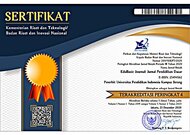Online Learning Motivation of Elementary School Teacher Education Students on The Understanding of Javanese Paramasastra of Perangan Awak Concept
Abstract
This study aimed to explain in detail how the objective conditions of motivation experienced by students in online learning of Javanese Paramasastra (grammar) of Perangan Awak (part of the body) concept. It is based on the factual conditions of the COVID-19 pandemic, which poses serious problems for face-to-face learning activities in universities. Therefore, online learning motivation is a skill that students must master. This study applied a quantitative approach with a survey method. The research was conducted at University of Nahdlatul Ulama Al Ghazali (UNUGHA), involving 97 4th-semester students in the elementary school teacher education study program. The data collection technique in this study used a survey technique with a Likert scale. The survey was made in a Google form for easy access by students. The data analysis technique employed in this study was to calculate the percentage of data from each indicator, interpret the data presentation scores, and analyze each indicator in depth. This study’s results revealed that the learning motivation of 4th-semester students in the elementary school teacher education program at Nahdlatul Ulama Al Ghazali University was very good, as seen from the percentage of motivation scores, which was 84.07%. Also, efforts to teach the Javanese language to increase students' motivation are to become cool teachers and direct students to practice Javanese Paramasastra of Perangan Awak concept in song covers.
Keywords
Full Text:
PDFReferences
Ahmed, R. (2018). Effects of online education on encoding and decoding process of students and teachers. IADIS International Conference on e-Learning 2018 (pp. 42–48). IADIS-International Association for Development of the Information Society.
Arrixavier, A. A., & Wulanyani, N. M. S. (2020). Peran fasilitas belajar dan motivasi belajar terhadap prestasi belajar pada mahasiswa penerima beasiswa Bidikmisi di Universitas Udayana. Jurnal Psikologi Udayana, 7(1), 81–90.
Azizah, S. N. (2015). Peningkatan konsentrasi dan hasil belajar IPA melalui mind mapping siswa kelas V SDN Jomblangan. Jurnal Pendidikan Guru Sekolah Dasar, 4(5), 1–13.
Crews, J., & Parker, J. (2017). The cambodian experience: Exploring university students’ perspectives for online learning. Issues in Educational Research, 27(4), 697–719.
Dhull, I., & Sakshi, M. S. (2017). Online Learning. International Education & Research Journal (IERJ), 3(8), 32–34.
El-Seoud, M. S. A., Taj-Eddin, I. A. T. F., Seddiek, N., El-Khouly, M. M., & Nosseir, A. (2014). E-learning and students’ motivation: A research study on the effect of e-learning on higher education. International Journal of Emerging Technologies in Learning (iJET), 9(4), 20–26.
Fauzi, A. R., Zainuddin, Z., & Atok, R. A. (2017). Penguatan karakter rasa ingin tahu dan peduli sosial melalui discovery learning. Jurnal Teori dan Praksis Pembelajaran IPS, 2(2), 27–36.
Harandi, S. R. (2015). Effects of e-learning on students’ motivation. Procedia–Social and Behavioral Sciences, 181, 423–430.
Hima, L. R. (2017). Pengaruh pembelajaran bauran (blended learning) terhadap motivasi siswa pada materi relasi dan fungsi. Jurnal Ilmiah Pendidikan Matematika (JIPMat), 2(1), 36–42.
Hung, M. L., Chou, C., Chen, C. H., & Own, Z. Y. (2010). Learner readiness for online learning: Scale development and student perceptions. Computers and Education, 55(3), 1080–1090.
Keller, J. M. (2016). Motivation, learning, and technology: Applying the ARCS-V motivation model. Participatory Educational Research (PER), 3(2), 1–13.
Lee, J., & Martin, L. (2017). Investigating students’ perceptions of motivating factors of online class discussions. International Review of Research in Open and Distance Learning, 18(5), 148–172.
Lepper, M. R., Corpus, J. H., & Iyengar, S. S. (2005). Intrinsic and extrinsic motivational orientations in the classroom: Age differences and academic correlates. Journal of Educational Psychology, 97(2), 184–196.
Mather, M., & Sarkans, A. (2018). Student perceptions of online and face-to-face learning. International Journal of Curriculum and Instruction, 10(2), 61–76.
Mustofa, M. I., Chodzirin, M., Sayekti, L., & Fauzan, R. (2019). Formulasi model perkuliahan daring sebagai upaya menekan disparitas kualitas perguruan tinggi. Walisongo Journal of Information Technology, 1(2), 151–160.
Nakayama, M., Mutsuura, K., & Yamamoto, H. (2014). Impact of learner’s characteristics and learning behaviour on learning performance during a fully online course. Electronic Journal of E-Learning, 12(4), 394–408.
Nurhayati, E. (2019). Penerapan buku saku dengan pendekatan saintifik untuk meningkatkan motivasi dan hasil belajar siswa pasca gempa bumi. Jurnal Kependidikan: Jurnal Hasil Penelitian dan Kajian Kepustakaan di Bidang Pendidikan, Pengajaran dan Pembelajaran, 5(2), 94–99.
Petrides, J. R. (2006). Attitudes and motivation and their impact on the performance of young English as a foreign language learners. Journal of Language and Learning, 5(1), 1–20.
Pilkington, O. A. (2018). Active learning for an online composition classroom: Blogging as an enhancement of online curriculum. Journal of Educational Technology Systems, 47(2), 213–226.
Sahu, P. (2020). Closure of universities due to coronavirus disease 2019 (COVID-19): Impact on education and mental health of students and academic. Cureus, 12(4), 1–6.
Schunk, D. H., & Usher, E. L. (2012). Social Cognitive Theory and Motivation. In R. M. Ryan (Ed.), The Oxford Handbook of Human Motivation (pp. 13–27). Oxford University Press.
Selvi, K. (2010). Motivating factors in online courses. Procedia–Social and Behavioral Sciences, 2(2), 819–824.
Siagian, R. E. F. (2015). Pengaruh minat dan kebiasaan belajar siswa terhadap prestasi belajar matematika. Formatif: Jurnal Ilmiah Pendidikan MIPA, 2(2), 122–131.
Sumirah, I., Sudrajat, A., & Sapriati, A. (2021). The effect of self-efficacy and organizational culture on the public elementary school teachers’ achievement motivation. EduBasic Journal: Jurnal Pendidikan Dasar, 3(1), 36–45.
Supartinah, S. (2010). Upaya peningkatan keterampilan berbicara bahasa jawa siswa kelas IV SD dengan model pembelajaran STAD dalam role playing. Widyaparwa, 38(2), 117–126.
Tiara, V., & Amrizal, R. (2019). Student’s perception of school’s image and learning motivation. Journal of Psychology and Instruction, 3(2), 64–70.
Traxler, J. (2018). Distance learning–Predictions and possibilities. Education Sciences, 8(1), 1–13.
Zhou, G., Chen, S., & Chen, Z. (2020). Back to the Spring of Wuhan: Facts and hope of COVID-19 outbreak. Frontiers of Medicine, 14(2), 113–116.
DOI: https://doi.org/10.17509/ebj.v4i1.36280
Refbacks
- There are currently no refbacks.
Copyright (c) 2022 Universitas Pendidikan Indonesia
This work is licensed under a Creative Commons Attribution 4.0 International License.
This journal is indexed by




.png)




.png)
1.png)


1.png)

.png)